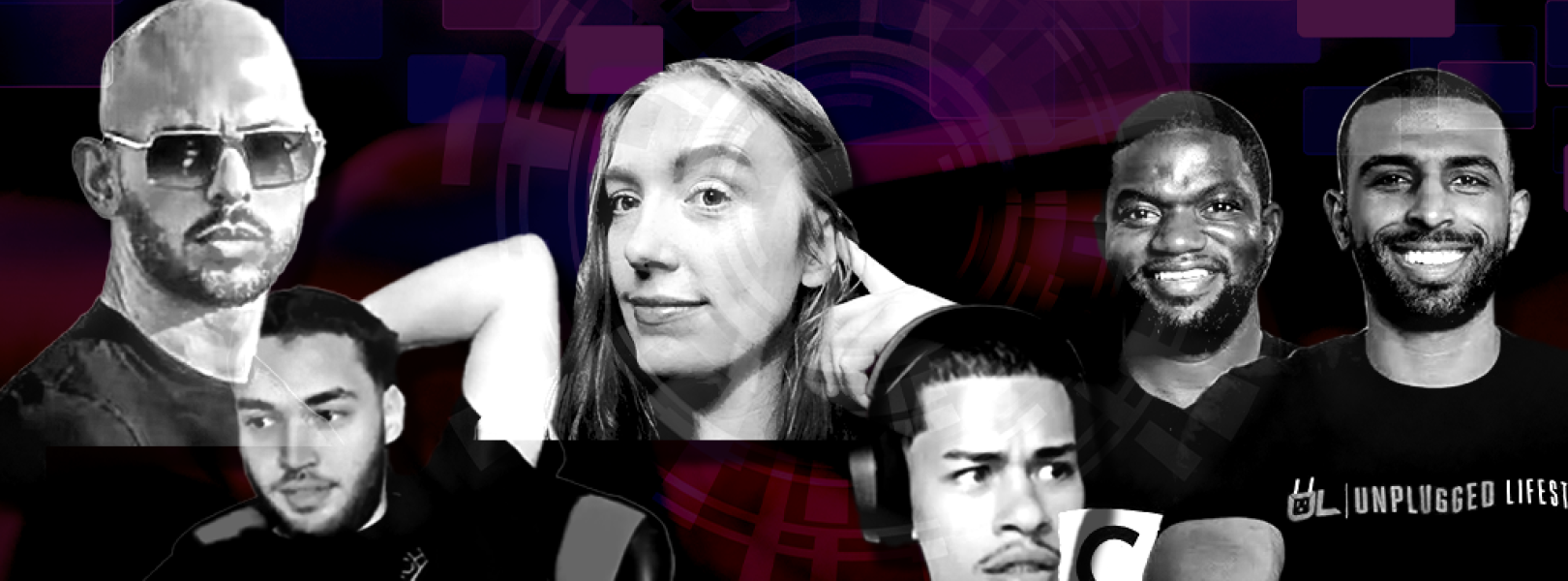Beyond Andrew Tate: Meet the misogynistic “manosphere” influencers proliferating across social media
Viral figures pushing hate are teaming up with extremists
Written by Justin Horowitz
Published
Before he was arrested by Romanian authorities for alleged rape, human trafficking, and organized crime, violent misogynist Andrew Tate provided advice to young men:
“Women should clean up. Not only should women clean up, women should clean up unprompted,” Tate once advised.
Tate also said rape victims should “bear some responsibility’ for their attacks. “I’m not a rapist, but I like the idea of just being able to do what I want.”
“The reason 18- and 19-year-olds are more attractive than 25-year-olds is because they've been through less dick,” Tate declared. “I'll say this right here on the fucking internet. I don't give a shit.”
These disturbing tidbits from Tate’s history are what made him a social media star to so many young men. It didn’t matter if his advice was crude, sexual, or hateful; Tate made a fortune making himself synonymous with the manosphere – a far-right community that recruits susceptible young men with toxic masculinity and misogyny.
Even after he was banned from major social media platforms, Tate was all over the internet. His fans flooded platforms with reposts of his misogynistic and abhorrent content, taking advantage of algorithms on platforms like TikTok.
Now, other right-wing manosphere influencers are repackaging Tate’s odious rhetoric for their own audiences. They are using social media to spread their messages and are diversifying their content strategies, posting on various platforms, and are pushing the limit on how far their hate speech can go (and often evading social media bans in the process).
Similar to Tate, some manosphere influencers are linked to far-right and white nationalist figures like Nick Fuentes.
What is the manosphere?
The manosphere is an online community of right-wing websites, bloggers, and influencers that is cultivating a worldview based on a conservative and outdated gender politics repackaged for the internet age, which valorizes pick up artists, violent misogynists, incels, men’s rights advocates, and conservative cultural critics. The group often blames women for myriad societal woes and treats them as an inferior sex.
Manosphere influencers, who are sometimes linked to far-right figures, recruit young men online by sharing content on social media platforms that speaks to the real issues and fears the demographic faces.
A February 12 article in The Conversation explains the allure of the manosphere to young internet users:
The manosphere appeals to its audience because it speaks to the very real lives of young men under the above factors – romantic rejection, alienation, economic failure, loneliness, and a dim vision of the future. The major problem lies in its diagnosis of the cause of male disenfranchisement, which fixates on the impacts of feminism. Here it contrasts the growing challenges faced by men with the increasing social, economic and political success experienced by women. This zero-sum claim posits that female empowerment must necessarily equate to male disempowerment, and is evidenced through simplified and pseudoscientific theories of biology and socioeconomics.
Manosphere influencers use their “isolated and indoctrinated community members” to profit, often selling self-help and guru-style assistance for a price and to keep a steady revenue stream. There is also a clear connection between the manosphere community and cryptocurrency traders, which aligns with the group’s profit-driven mindset (lovingly dubbed “the grindset.”)
Some of these influencers also use fitness and weightlifting motivation content as an entry point to grab the attention of young male audiences; this allows the content creators to bring in a larger population of viewers before delving into the outright hatred of women.
There appears to be a support system within the manosphere influencer community, with content creators who spew similar hateful rhetoric inviting each other onto their respective shows and podcasts. In doing so, some of these influencers may be introducing their followers to personalities that could be further to the right.
Here are some up-and-coming manosphere influencers who are proliferating across social media:
Fresh & Fit Podcast
The Fresh & Fit podcast, which describes itself as “the #1 men’s podcast in the world,” is a safe haven for its misogynistic listeners.
The show is hosted by Why Women Deserve Less author Myron Gaines and dating and lifestyle coach Walter Weekes, both of whom have amassed significant social media followings across platforms for themselves and their show, which has over 1 million subscribers on YouTube. (The show previously received a seven day ban for violating YouTube’s hate speech policy.)
The podcast is also viral on TikTok although the show was allegedly banned from the platform. There are millions of video views under the “#freshandfitpodcast” and #freshfitpodcast” hashtags and a number of accounts that repost Fresh & Fit content.
The hosts have claimed that the show is meant to cover “females, fitness, and finances,” and it regularly spews misogynistic and anti-LGBTQ rhetoric. In its heavily circulated “after hours” show, the pair sits down with groups of women to debate a variety of topics, often demeaning the women in the process.
In one viral episode, the hosts argued that women who are in relationships and have Instagram accounts are cheating on their partners by using the app.
“I think a woman having an Instagram is 100% cheating, especially if she has scantily clad photos of herself on the internet,” Gaines said.
In another viral clip, the hosts said that they refuse to date Black women.
The podcast hosts have repeatedly hosted Tate in the past and have argued his innocence.
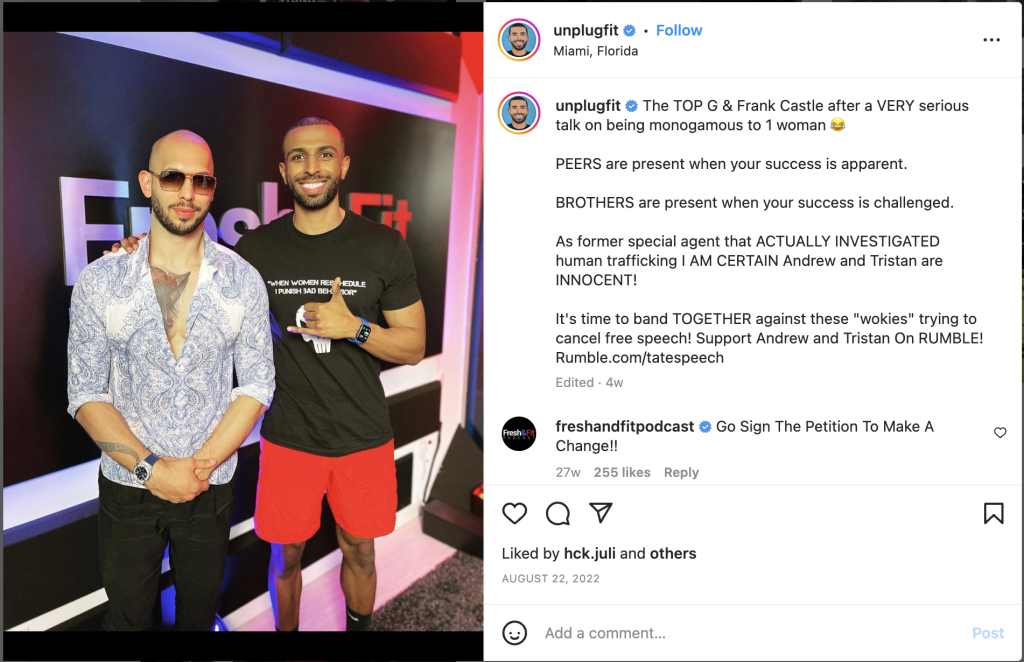
Citation Screenshot from Myron Gaines' Instagram page
Neo-Nazi ally Milo Yiannopoulos has claimed multiple times that he will be a Fresh & Fit podcast guest. He has yet to appear on the show.
Sneako
Content creator Sneako, who has been described as “a cheap imitation of Tate,” rose to prominence on YouTube for posting gaming, motivational, and man-on-the-street interview videos. Additionally, Sneako worked with popular YouTuber MrBeast.
Sneako later shifted toward making misogynistic and hateful content.
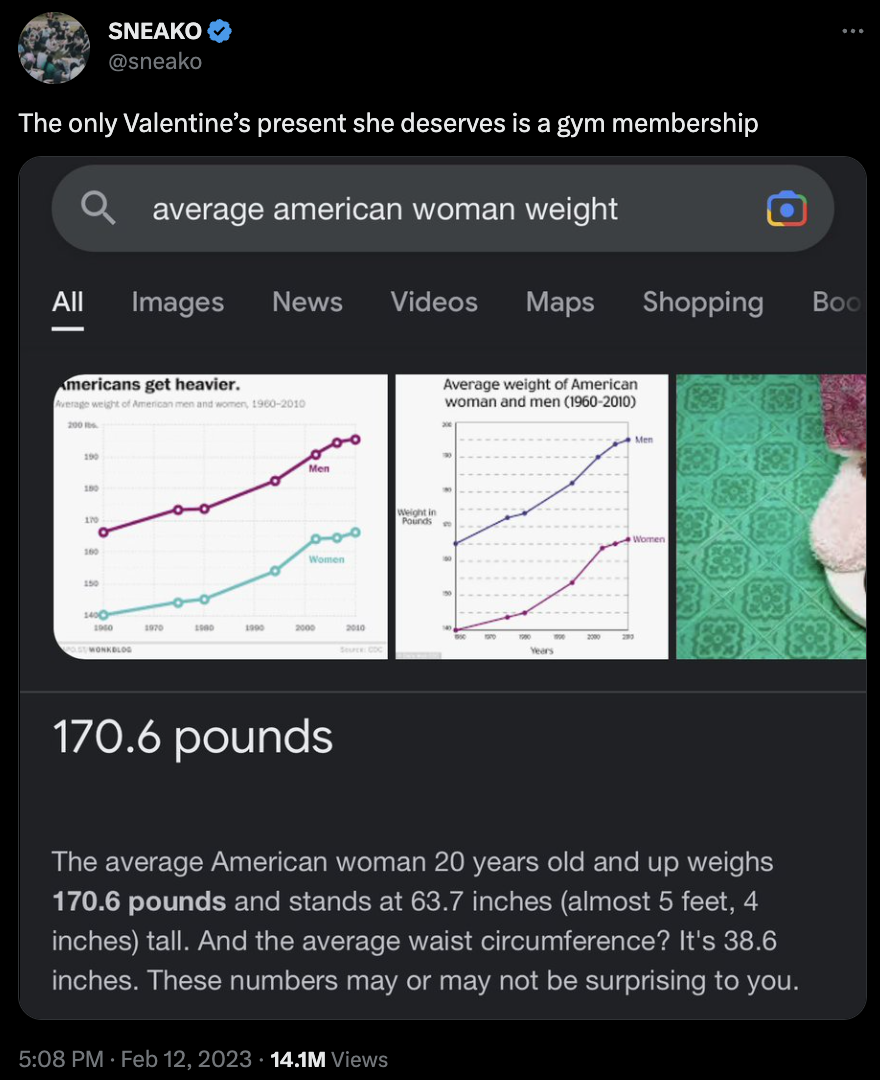
Citation Screenshot from Sneako's Twitter page
Sneako has also gained notoriety for his connection to white supremacist Nick Fuentes. Both Sneako and Fuentes have proclaimed their admiration for each other online and the influencer worked with Fuentes and Yiannopoulos on Ye’s (formerly Kanye West) unofficial presidential campaign following the rapper’s unhinged pro-Nazi comments on right-wing media.
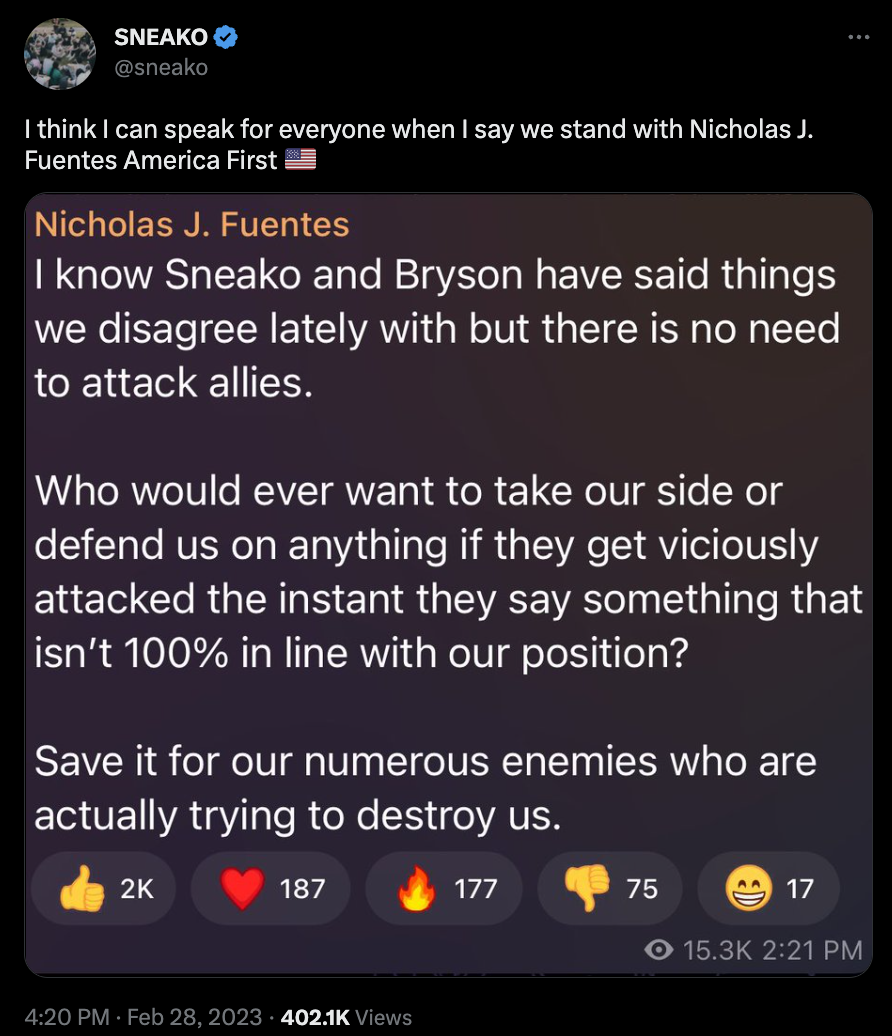
Citation Screenshot from Sneako's Twitter page
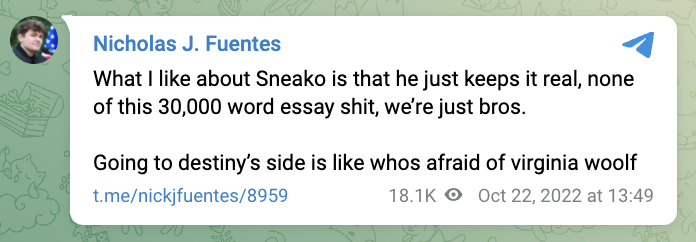
Citation Screenshot from Nick Fuentes' Telegram account
Sneako currently streams on Rumble with 195,000 subscribers and has significant followings on Twitter (372,000 followers) and Instagram (576,000 followers). Sneako claims he had 1 million YouTube subscribers on his channel before it was removed for violating community guidelines.
Although Sneako says he was banned from TikTok, there are billions of video views on the platform under the “#sneako” and “#sneakoclips” hashtags. Sneako even sells what he describes as “the creativity kit 2.0” that includes TikTok virality mentorship and “the secret Tiktok blueprint that Sneako used to gain over 5 billion views on his tiktok hashtags in only a few months.” In a similar fashion to Fresh & Fit, multiple TikTok accounts are devoted to reposting Sneako’s content.
Sneako is also a very vocal supporter of Tate and is a frequent guest on the Fresh & Fit podcast, where he has belittled women alongside the hosts.
The influencer has churned out misogynistic and racist content, including videos on “why ugly girls think they’re beautiful” and “how women manipulate men.” Sneako has also made anti-LGBTQ and anti-vaccine comments.
H. Pearl Davis
H. Pearl Davis is a podcaster and manosphere influencer who uses social media to spread men’s rights, anti-women, and anti-trans messages.
On her platforms, Davis has defended men cheating and leaving women for gaining weight, not cooking, or not sleeping with them. She has gone on a crusade against women for being what she describes as “shitty wives.”
Citation From @justpearlythings.5 TikTok account
Davis has built a substantial social media following with over 1 million subscribers on YouTube and over 107,0000 followers on Twitter. She currently has 183,000 Instagram followers and 316,000 TikTok followers, although she claims she was banned on both platforms.
Pearl claims she was banned from TikTok for calling a woman a “land whale.”
Like Sneako, Davis has a relationship with Fuentes. She has defended him on Twitter and sat down with him recently for a friendly, lengthy interview where he defended his participation in the 2017 white supremacist rally in Charlottesville, Virginia, denied the Holocaust, and explained his antisemitic, pro-Putin, and white nationalist worldview.
After Fuentes explained his vision for an ethno-nationalist state, Davis replied, “That kinda makes sense, like what you’re saying.”
Citation From the March 2, 2023, edition of JustPearlyThings' The Sit-Down Show
Davis also hosted Fuentes for a panel discussion where he defended sexual harassment and domestic abuse, calling it “rough housing.”
Citation From the March 2, 2023, edition of JustPearlyThings' Pregame
Following his appearance, Davis retweeted praise of Fuentes. He later used his interview to promote antisemitism.
Davis has also previously hosted and defended Tate on her show and social media.
Adin Ross
Streamer and content creator Adin Ross, who is another associate of Fuentes, has a large social media following. Ross currently has 3.5 million subscribers on YouTube, 2.1 million Twitter followers, 5.6 million Instagram followers, and 6.4 million followers on TikTok.
Ross was recently permanently banned from the streaming platform Twitch, where he had 7.2 million followers. Following his ban, the streamer began making anti-trans comments online.
Ross currently streams on Kick, a new streaming platform that has loose content moderation policies.
Last month, Ross called Fuentes to discuss the “Day of Hate,” a neo-Nazi call to action that was allegedly meant for supporters to spread antisemitic propaganda and cruelty. There was reportedly no violence.
It’s unclear why Ross would invite a known antisemite and Holocaust denier on his stream to downplay a day meant to spread Jewish hatred and violence.
Ross appears to have an undying love and admiration for Tate. The influencer has created a large amount of content about Tate, including reaction videos and multiple interviews.
Additionally, Ross reportedly shaved his head in support of Tate and he is on the list of individuals who can visit the alleged criminal in Romanian jail. At one point, Ross suggested that Tate was “doing God’s work before he got locked up for this nonsense.”
Citation From the March 3, 2023, edition of Adin Live
Ross has used the N-word in the past, asked strangers to “act Black” online and say racial slurs for money, and has used an anti-LGBTQ slur.
Other misogynistic influencers and real-world impact
Andrew Tate was not the first manosphere influencer in the right-wing media ecosystem.
In the past, other trolls and figures have pushed similar anti-feminist rhetoric to gain notoriety and make money in the right-wing media space. Misogyny is almost ubiquitous in the right-wing media environment.
For example, The Daily Wire pundit Matt Walsh has made numerous misogynistic and anti-feminist comments. In one instance, Walsh suggested that being pregnant and giving birth is “harder” for men than it is for women:
Citation From the September 22, 2022, edition of Daily Wire's All Access Live
Troll, Pizzagate conspiracy theorist, and ayahuasca enthusiast Mike Cernovich previously made a name for himself after supporting white supremacists, denying the existence of date rape, and being a full-blown misogynist.
Alongside Cernovich is “neomasculinity” and antisemitic figure Daryush “Roosh” Valizadeh. Valizadeh is an author and “pick up artist” coach who advocates for state-sanctioned rape and believes that women are good for “only the sexual pleasure and fertility they can provide.” Valizadeh currently operates a deeply religious blog that promotes violent misogyny and the hatred of Jews.
Manosphere influencers were a critical driver of Gamergate, a harassment campaign against women who worked in the video game industry that pushed violent misogyny and anti-feminism. Several women received death and rape threats for years from online harassers.
Online gamers like Ross and Sneako turning to hateful or misogynistic content (which echoes Tate) after being banned from mainstream platforms has reminded some audiences online of the rhetoric that was used to attack women during Gamergate.
As some of these creators are banned from mainstream platforms like YouTube, they are leading their followers to more fringe online spaces like Rumble, which hosts and profits from QAnon and white nationalist content. For example, Sneako now streams on Rumble after being banned from YouTube. The Fresh & Fit podcast posts its shows on Rumble too.
The manosphere rhetoric does not just live in an online vacuum, and can lead to real-world violence, threats, and harassment.
Reporting demonstrates how easily toxic rhetoric like Tate’s can infiltrate the minds of young audiences, even among users as young as 11-years-old. Parents in particular should be aware of the dangers these figures pose.
